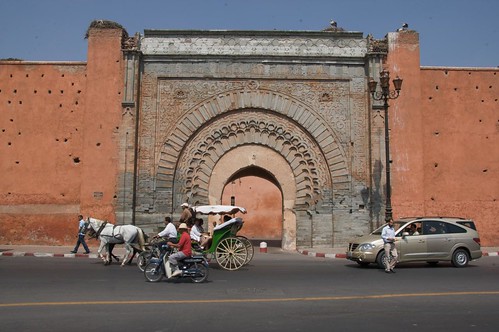The name "MOROCCO" originates from the name of Marrakech originally called "Morkach", a name which was given to him by historians.
Around 1000 BC, Marrakech was a camp where caravanners who ensured a flourishing trade with black Africa were landing before crossing the Sahara. It is in 1062 that the Almoravid leader, Youssef Ben Tachfine taken place as this camp for his armies. He built the first mosque.
 Marrakech at the instigation of the Almoravids became an important cultural, commercial, and religious beamed across the Maghreb, Andalusia, and black Africa.
Marrakech at the instigation of the Almoravids became an important cultural, commercial, and religious beamed across the Maghreb, Andalusia, and black Africa.It is at this time that Marrakech was elected capital of the kingdom.
It is also during this period that was the planting of the palm.
The legend says that these are the nuclei of dates eaten by soldiers and thrown to the ground, which were the Palmeraie ......
We have the city walls to the son of Youssef Ben Tachfine Ali Ben Youssef (Ben meaning in Arabic: son of ...)
During the XII century, Abd el-Moumen, founder of the dynasty, the Almohads Marrakech besieged for nine months, and took the city.
During the reign of the early kings Almohads, the "Red City" is the capital of a prosperous empire. This is Yacoub Al Mansour who finished the mosque and the minaret of the Koutoubia.
The city was visited by poets, artists, writers, scholars, and it shone more beautiful.
But in 1258, with the Merinid dynasty, Marrakesh was abandoned by its writers and artisans, in favor of the city of Fez, rival forever, which became the capital.
It was not until the Saadi, Marrakech around 1554 that once again become the capital, and regains its pomp and prestige. They are the source of many monuments and palaces, as "Badi Palace."
Saadian tombs that date from this period were not discovered until 1917.
Another dynasty, the current Alaouite dynasty, succeeded to Saâdiens. Sultan Moulay Ismail began construction of a new capital, Meknes he wanted the image of Versailles.
During the installation of the French protectorate in Morocco in 1917, Marrakech was ruled by the Pasha Glaoui who was a great friend of the French power. El Glaoui, aided by the French extended his power over all the Berber tribes of the region. He was one of the largest and richest governors that time.
In 1956, with the arrival of independence, he withdraws all his possessions. He died three years later. The visitor can access the Glaoui palace in the Medina of Marrakech.
In 1927, King Mohammed V, ascended the throne. Faced with the French protectorate, he demanded the independence of Morocco, and political empowerment. August 20, 1953, France placed Mohamed V who was exiled to Corsica and Madagascar, with his son, whose future King Hassan II. The Moroccan people rebelled and forced Paris to negotiate with the Sultan Mohamed V. On 7 April 1956, after forty-four years of foreign domination, Morocco finally regained its independence and unity. King returned home, hailed as the liberator of the nation. In 1958, he announced economic reforms, political and social. He set up institutions for direct participation of the people in the management of public affairs. February 26, 1961, at the death of his father, Hassan II succeeded to the throne of the Kingdom, and respecting the promise made to his father, he never ceased to work for the greatness of his country, development, economic social, and religious. "Commander of the Faithful," Great King builder, modernizing, and respected by all governments, he had the great idea in 1975, the great peaceful Green March and the Moroccan people marched to the Sahara in order to assert the membership of this territory and reunited Saharan provinces.
We also owe the construction of the Great Mosque Hassan II in Casablanca. He reigned for 37 years.
In July 1999, after the death of his father, the Prince Sidi Mohammed, was inducted in the name of Mohammed VI.,
We owe him already today many modernizations and reforms and notament in family law and women's rights in Morocco.


morocco culture,moroccan food,morocco food,moroccan cuisine,morocco beaches,moroccan meal,beaches in morocco,moroccan culture,hercules cave,hercules cave morocco
